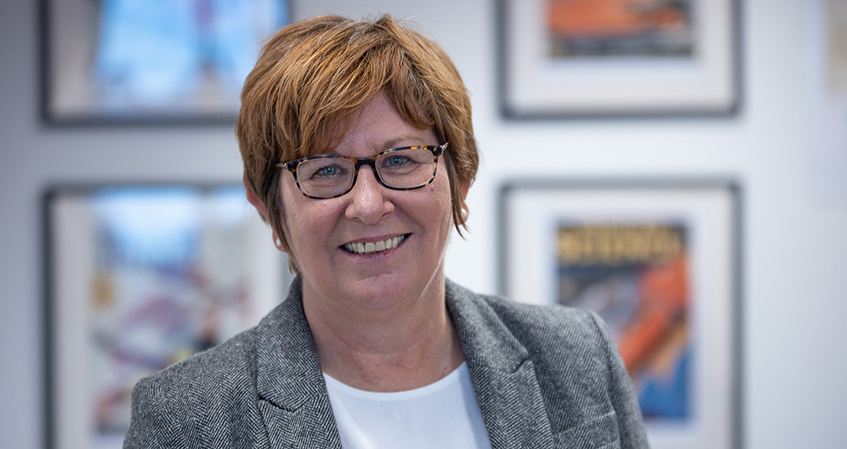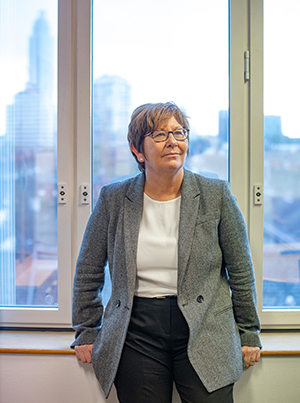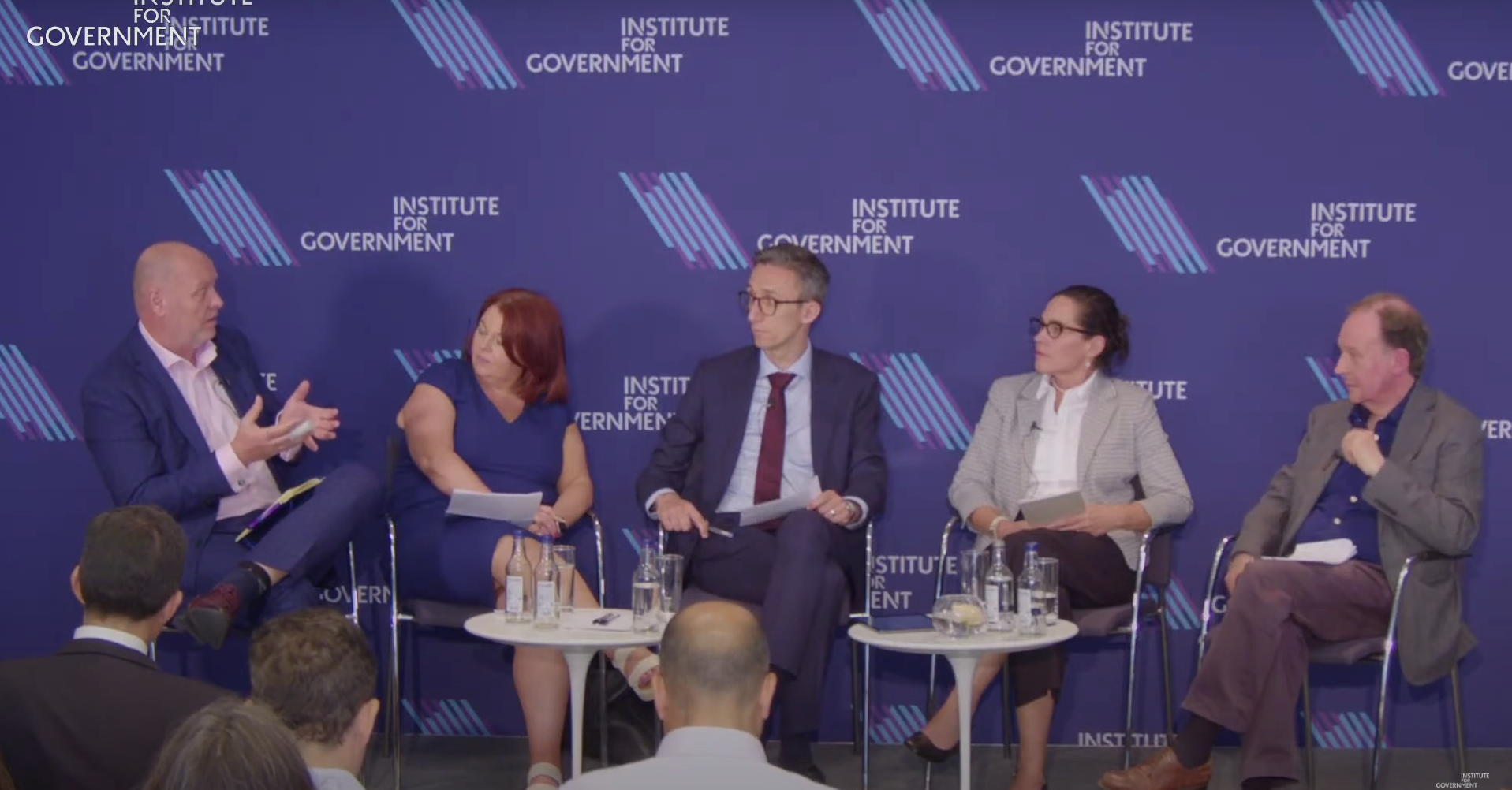The sharp end of delivery: Interview with Bernadette Kelly

Transport, one could argue, runs in Bernadette Kelly’s blood, though she never shared this fact until she was appointed Permanent Secretary. “Then I talked about the fact my dad was a bus driver. I did it because people in transport really love transport,” she laughs, “and I knew this would go down very, very well.”
And of course, it did. Kelly has a unique insight into people and their needs: a quality which serves her well as both a department head and Civil Servidce Social Mobility Champion.
Kelly graduated from the University of Hull in the 80s and not having “a particularly clear idea what I wanted to do with my life,” found herself sitting the Civil Service Fast Stream exam, which led to her being offered a role as an Executive Officer. “I thought ‘Hmm, this could be quite an interesting place to work’,” she recalls. “And here I am, 30 plus years later.”
Since then, Kelly has been in departments and jobs where she has been “building up an understanding of how different aspects of the economy work and work together to drive growth in different places”, from working on housing and planning to a “stint in the Treasury”. Though she has spent time working in Cabinet Office and the No 10 Policy Unit, she prefers working in departments where’s she a “little bit closer to the coalface” best. Kelly likes to be on the “sharp end of delivery” and, in 2017, she was appointed to her current role as Permanent Secretary for the Department for Transport (DfT). Though ideal for someone who likes to “directly own outcomes” and work with external stakeholders, her first two and a half years on the job have been a steep learning curve.
“We really had quite a difficult 2018,” Kelly admits. There were the pressures of Brexit preparations; May’s rail timetabling issues; and challenges around the cost and schedule of Crossrail – one of the department’s most high-profile projects. “It felt like a tough year, with a lot of things hitting us, so for me 2019 has been about how we learn from those experiences and become more resilient as an organisation.” For example, she explains, DfT has worked with the Infrastructure and Projects Authority to publish a report in April on how to deliver big projects in government.
Kelly’s determination to “squeeze all the interesting insight” out of every challenging situation has already borne fruit. When Thomas Cook collapsed in September this year, thousands of holidaymakers were left stranded abroad. DfT, working with the Civil Aviation Authority and the Foreign and Commonwealth Office, was able to get these people back home. They were partly able to execute such a big, difficult plan in very short notice “because we had a slightly smaller but similar event 18 months ago when another airline collapsed.”
Running a department that works on multi-billion-pound projects, Kelly recognises that the demands of these feats can take a toll on her staff – not least EU Exit preparations. “Every week, my Executive Committee has been testing our plans on Brexit resilience,” she tells us, “and wellbeing is always top of our minds. Thinking how people are feeling, what kind of level of stress we might be putting people under, ensuring that we’re giving people as much certainty as we’re able to in a naturally uncertain time.” Ahead of the 31 October deadline, the DfT had a four day on, four day off shift pattern to make sure staff “doing potentially difficult work were also getting recovery time”.
Following the most recent Brexit extension, Kelly insisted that her people were given “a moment of decompression before we start firing on all cylinders again”. She notes that there will be a “weariness from people, who feel a bit exhausted at the thought of being marched up a hill and marched down again, not just once, but twice.”

Kelly admits that she asked the late Jeremy Heywood – then Head of the Home Civil Service – for the Civil Service Social Mobility Champion role. She remembers him looking at her “quizzically” as he said he wanted someone “who was authentic to do it.”
“He meant not posh,” Kelly elaborates. 59% of Permanent Secretaries were privately educated; 56% went to Oxbridge. “I came from what I would call a fairly ordinary working-class background in Birmingham,” she says, “so I told him ‘that could be me.’”
There is a “lot of pent up interest and enthusiasm for talking about socioeconomic background and social mobility”, argues Kelly, and an explosion of activity in this area. “In a period of nearly four years, the Cross Government Social Mobility Network has gone from a standing start to almost thirty branches, at the last count,” and the civil service has already achieved a lot in this field – she points to the fact that fifteen departments or teams within the service were listed in the social mobility index this year. Still, she is excited for the work which is to be done.
For the first time ever, the People Survey – sent annually to more than 400,000 civil servants – included questions on people’s socio-economic background. “It’s going to create the most amazing dataset,” Kelly explains. “We’ve got Sam Friedman, a leading academic working for the Social Mobility Commission, working with us to think how we analyse and supplement that data with some qualitative analysis.” This will help provide further insight for what barriers people from lower socioeconomic backgrounds might face, and what the civil service needs to do to overcome them.
2019 also saw the first ever Cross Government Social Mobility conference. “One of the things we found was that the socio-economic diversity of people applying and succeeding in some of our professions and function is greater than those applying for policy roles. So people might join as a finance, or commercial, or digital, or policy delivery expert, who wouldn’t necessarily see the civil service as being for them,” Kelly says. By focusing on this area, she believes, we can drive social mobility: both by looking at creating opportunities for entrants, and opportunities for progression.
“One of the things we have been looking at is minimum entry qualifications, and whether they need to be quite as high as they are. It’s very convenient for us to say people need a particular kind of qualification, because it sifts the field, but it also excludes people,” Kelly explains. She also cites the “fantastic degree level apprenticeship” offered by the Government Economic Service, and DfT’s own participation in a targeted scheme to bring more care-leavers – a group that “all indicators show have the poorest life chances” – into the civil service.
Then there’s the focus on regional expansion, and the ‘Beyond Whitehall’ project. “The vast majority of senior policy jobs are here – 80% of policy senior civil servants are still in London.” Kelly wants to change this dynamic, and cites “a real interest in whether we can have more of these leadership roles spread around the country, and create opportunities for people to build their career” without needing to move to the capital. Such relocation is, she notes, a barrier to social mobility.
“Around the country,” Kelly says, “people are saying we would understand the issues they’re facing if we weren’t so London-centric.” There is a democratic onus, therefore, to having “physical proximity to the communities we serve”.
Social Mobility Workstream: Four key work priorities for the civil service
At the 2019 Cross Government Social Mobility conference, delegates from across the civil service gathered to discuss the obstacles facing those from lower socio-economic backgrounds from both getting roles in the service, and getting ahead. They also sought out ways to address these challenges, and “drilled down” into four key themes.
These represent four work priorities, and inform a plan that will be carried out in partnership with the Cross Government Social Mobility Network to increase socioeconomic diversity within the civil service.
The following four key work priorities are:
Measuring data
Rolling out socio-economic background measures across the civil service, to develop a baseline of data by 2020. Begin to use this to inform policy and strategy, especially about improving the representation of those from lower socioeconomic background.
Attraction and progression
Supporting the civil service to attract a wider pool of candidates in terms of socio-economic diversity. This includes:
- Collaborating with and support Schools Outreach programmes across departments, targeting schools are those with higher than the national average of free school meal provision.
- Targeted recruitment campaigns, work experience and internships, apprenticeships, and looking at a potential move into work programme
for those entering work from homelessness. - Creating a Civil Service Commitment to make private rental deposit schemes available to all new starters, and a ‘float’ loan system for first month of work.
- Examining support for progression of staff from low socio-economic background.
Regions
Ensuring all social mobility action has a geographical lens, so that the civil service can provide access to quality jobs across the UK and be a geographically inclusive employer. This includes:
- Expanding regional footprint across functions, grades and departments.
- Working with the Government Hubs Programme, Places for Growth Team and Beyond Whitehall to ensure estates strategy is founded on improving social mobility.
- Ensuring accessibility of opportunities e.g. interview locations, access to computers.
- Supporting, developing and working with Regional Social Mobility Networks.
Professions and functions
Promoting the social mobility agenda and embedding best practices across all civil service professions and functions. This includes:
- Encouraging all professional and functions to gather data on the socioeconomic diversity of their profession.
- Encouraging all professions to have a Social Mobility Network.
- Encouraging all Heads of Professions to have social mobility objectives.
Related News
-

FDA rejects claims civil service to blame for delays to Northern Ireland infrastructure projects
The FDA’s National Officer for Northern Ireland Robert Murtagh has spoken out against claims that the Northern Ireland Civil Service, were to blame for the failure of infrastructure projects to be completed on time.
-

Penman joins panel discussion on ethical leadership in government at IfG ‘Nolan Principles at 30’ conference
FDA General Secretary Dave Penman took part in a panel discussion covering the question ‘How can politicians demonstrate ethical leadership?’.
-

Carers Week 2025 – launching our Carers’ Survey
To mark Carers Week 2025 (9-15 June), the FDA is launching a survey of carers in the civil service to find out what progress has been made since our 2021 report, and what still needs to be done.